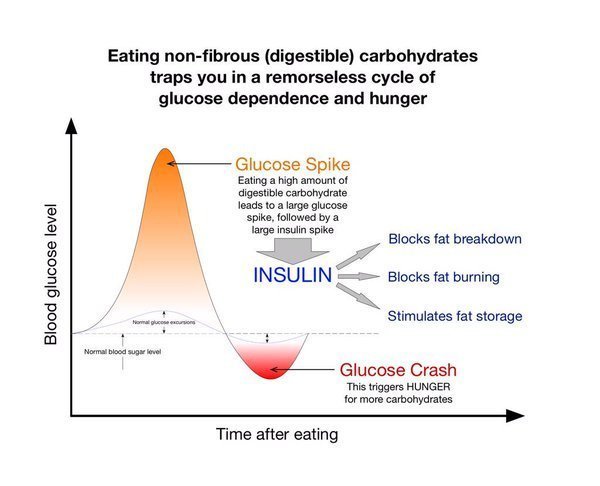If we need to lose weight, we are told to ‘Eat less and move more’. Both of these ideas come form the mistaken belief that our weight is controlled by calories in minus – calories out. We do not have a calorie counting gland in our stomachs. However, we do have hormones and their response always differs to protein, fat or carbohydrate. It is the type of food we eat that makes us gain weight, and damages our metabolic health. These pictures do not demonstrate a long-term strategy for weight loss and health.
The obesity epidemic, which afflicts so many people, has been caused by our hormonal response to the high-carbohydrate, low-fat diet enshrined in the National Dietary Guidelines. The ‘experts’ tell us to avoid fat because there are more calories in a gram of fat than a gram of carbohydrate, but calories do not control our weight. The hormone Insulin controls our weight and carbohydrates cause a surge in insulin. Dietary fats have no meaningful effects on insulin levels.
The National Dietary Guidelines tell us to base our meals on carbohydrates such as bread, potatoes, pasta and rice. All of these foods contain carbohydrate in the form of starch, which is a long chain of glucose molecules joined together. Our digestive enzymes easily slice these glucose molecules off the chain and absorb glucose into the blood stream. This makes the blood sugar level shoot up, which in turn triggers the release of insulin to bring it back to normal. If the cells don’t need any more energy and the glycogen store is full, insulin gets the liver to convert the glucose into fat. The blood sugar level now comes down but, if it has spiked high, the pancreas has to produce a lot of insulin and a lot of insulin makes the sugar level fall too low, which triggers a feeling of hunger. You only ate a couple of hours ago but now you feel hungry again. You eat some more carbohydrate and the process repeats itself.

This is known as the blood sugar roller-coaster: blood glucose spikes up; insulin stores the energy as fat; blood sugar comes down too far and you feel hungry. You eat more carbohydrate and blood sugar spikes up again and insulin stores it as fat. This is the reason obese people always keep eating. It is not because they are greedy: it is because they are hungry. They are stuck on an extreme version of the sugar and insulin roller-coaster. The only way to get off is to stop eating food that raises blood sugar. Carbohydrate raises blood sugar and insulin levels further and faster than anything else. Protein raises insulin a little bit but fat hardly moves it all.
How can we change our food intake to lose weight and improve health? Click here.
